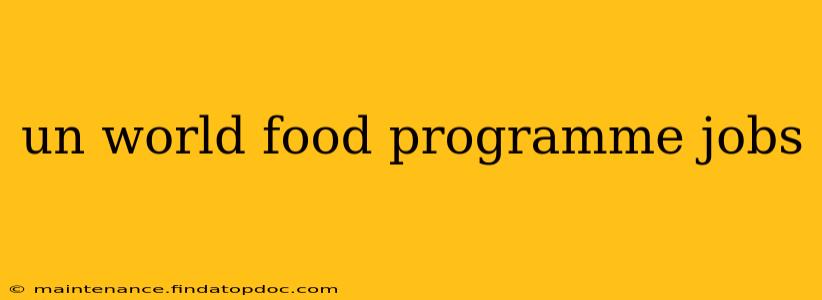The United Nations World Food Programme (WFP) is the leading humanitarian organization fighting hunger worldwide. With a vast global presence, it offers a wide array of jobs for professionals dedicated to tackling food insecurity and malnutrition. This guide will explore the diverse career opportunities within WFP, helping you understand how to find and apply for these impactful roles.
What Types of Jobs Does the WFP Offer?
The WFP employs a diverse workforce with expertise spanning various fields. Job opportunities aren't limited to just food-related roles; they encompass a broad spectrum, including:
-
Programmes: This area focuses on the core mission of delivering food assistance. Roles might include program officers, monitoring and evaluation specialists, and logistics coordinators, all working to ensure efficient and effective food distribution.
-
Operations: This department handles the logistical side of food aid, from procurement and transportation to warehousing and distribution. Jobs here often involve supply chain management, engineering, and transportation expertise.
-
Administration and Finance: These crucial support functions manage the organization's finances, human resources, and administrative processes. Opportunities exist for accountants, finance officers, human resource specialists, and administrative assistants.
-
Information Technology: WFP leverages technology to streamline operations and enhance program delivery. IT professionals, developers, and data analysts play a vital role.
-
Communications and Advocacy: Raising awareness about hunger and WFP's work is key. This area employs communication officers, media specialists, and advocacy experts to effectively communicate the organization's impact and needs.
How to Find WFP Job Openings?
The primary source for finding WFP jobs is the official WFP website's career portal. Regularly checking this site is crucial, as openings are frequently updated. You can also explore other job boards that often list international development opportunities, but always verify the listing's authenticity through the official WFP website.
What are the Requirements for WFP Jobs?
Requirements vary widely depending on the specific role and level of seniority. However, several common themes emerge:
-
Education: Many positions require at least a bachelor's degree, often in a relevant field such as international development, logistics, nutrition, or a related discipline. Postgraduate qualifications are often advantageous for senior roles.
-
Experience: Prior experience in a relevant field is usually essential. The amount of experience required depends on the position's seniority. International experience, particularly in humanitarian settings, is highly valued.
-
Language Skills: Proficiency in English is generally mandatory. Additional language skills, especially those relevant to the region where you're applying, significantly enhance your chances.
-
Technical Skills: Depending on the specific role, technical skills such as data analysis, project management software proficiency, or specific software applications may be required.
What is the Application Process for WFP Jobs?
The application process typically involves:
-
Online Application: You'll apply for suitable positions through the WFP career portal. This involves creating a profile and submitting your CV/resume and cover letter.
-
Assessment: Depending on the position, this stage may involve written tests, online assessments, or interviews.
-
Interviews: Successful candidates will be invited for interviews, potentially multiple rounds, with members of the hiring team.
-
Background Check: A thorough background check is standard practice for all WFP employees.
-
Offer of Employment: If successful, you will receive a formal offer of employment.
What are the benefits of working for the WFP?
Working for the WFP offers numerous benefits, including:
-
Making a Difference: The chance to contribute directly to fighting global hunger and malnutrition is incredibly rewarding.
-
International Experience: Working in various countries offers valuable international experience and exposure to different cultures.
-
Competitive Salary and Benefits: The WFP offers competitive salaries and benefits packages, which vary based on location and position.
-
Professional Development: Opportunities for professional growth and development are plentiful within the organization.
How competitive is it to get a job at the WFP?
Competition for WFP jobs is typically high due to the organization's reputation and the significant impact of its work. A strong application, highlighting relevant experience and skills, is essential.
This comprehensive guide provides a starting point for exploring job opportunities with the UN World Food Programme. Remember to consult the official WFP website for the most up-to-date information and job postings. Good luck with your application!
